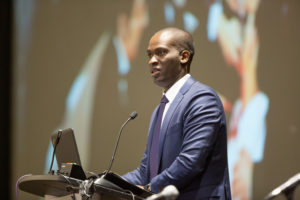On Saturday, ASA recognized this year’s recipients of the 2019 Award for Excellence in Research and the James E. Cottrell, M.D., Presidential Scholar Award. Anesthesiology Editor-in-Chief Evan D. Kharasch, M.D., Ph.D., introduced the recipients. Dr. Kharasch is Professor of Anesthesiology, Vice Chair for Innovation and Director of Academic Entrepreneurship at Duke University School of Medicine. Each recipient presented brief lectures on their research accomplishments.
Judith Hellman, M.D., Excellence in Research Award
The 2019 Award for Excellence in Research went to Judith Hellman, M.D., who is the William L. Young, M.D., Endowed Professor and Vice Chair for Research at the UCSF Department of Anesthesia and Perioperative Care. Dr. Hellman’s research has focused on the relationship between microorganisms and the body’s innate immune system. In particular, Dr. Hellman has tracked how that relationship has led to shock and organ dysfunction in sepsis and inflammatory critical illness. Approximately 19.4 millions cases of sepsis are reported annually, while it claims 5.3 million lives each year.

Judith Hellman, M.D.
“Unfortunately, there are no approved drugs for the specific treatment of sepsis, and numerous Phase III clinical trials have failed,” she said.
Considering the role sepsis plays in many ICU deaths and the challenge to diagnose and treat the condition, Dr. Hellman’s research has looked at the role of the endocannabinoid system in acute inflammation an injury. Her research is working to uncover new discoveries on immune modulation by the endocannabinoid and endovanilloid systems that may lead to key therapeutic targets for sepsis and acute inflammation.
One such target may be cannabis. According to Dr. Hellman’s research, the N-arachidonoyl dopamine (NADA) element of the endocannabinoid system appears to reduce inflammatory activation of endothelial cells. Non-TRPV1 mediates NADA’s anti-inflammatory effects.
“NADA is putatively the most potent endogenous TRPV1 agonist,” she said.
Similarly, she studied the anti-inflammatory effects of THC, which improves sepsis scores in mouse studies and reduces acute lung injury.
Seun Johnson-Akeju, M.D., M.M.Sc., James E. Cottrell, M.D., Presidential Scholar Award
The recipient of this year’s James E. Cottrell, M.D., Presidential Scholar Award is Seun Johnson-Akeju, M.D., M.M.Sc., who serves as Director of Neurosurgical Anesthesia at Massachusetts General Hospital.

Seun Johnson-Akeju, M.D., M.M.Sc.
Dr. Johnson-Akeju’s collaborative and cross-disciplinary research has focused on the neurophysiological mechanisms of general anesthesia-induced brain states, and sleep and anesthesia-associated neurocognitive dysfunction. Additionally, he has a particular interest in studying the negative side effects of anesthesia to the aging patient’s cognition.
Dr. Johnson-Akeju’s research goal has been to establish an innovative clinical neuroscience research program using anesthesia as a tool for studying the systems-level mechanisms of fundamental neurobiological processes. In particular, his research has focused on minimizing ICU neurological dysfunction with dexmedetomidine-induced biomimetic sleep.
“Our patients entrust us with their lives. What we know is that neuro activity firing is important to processing information,” he said. “To understand these mechanisms, we need to understand every neuron. At present, studies leverage intraoperative data. This approach is far more powerful than anything else we have.”
As reported in Anesthesiology, Dr. Johnson-Akeju’s training is “unique as it encompasses basic science, systems neuroscience, including signal processing, and formal training in clinical research methods.”

“The patient we take care of today is getting older,” he said. “I close with a picture for the future. Older patients are more vulnerable and we need to change our care for these patients leveraging a tool that will enhance and boost memory.”
The session also introduced the Mentoring Excellence in Research Award recipient from the Academy of Research Mentors in Anesthesiology, and the winner of the Resident Research Essay contest.
Return to Archive Index